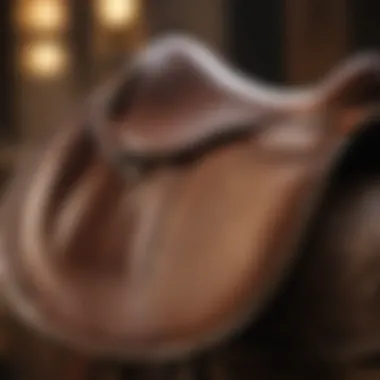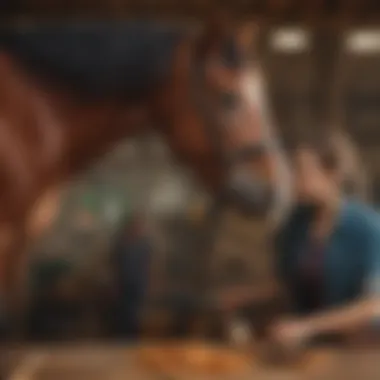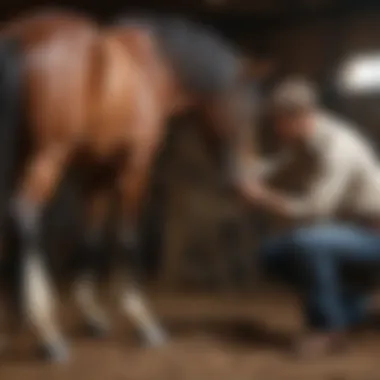Where to Find Your Perfect Equine Companion: A Detailed Guide for Future Horse Owners


Pet Care Essentials
When venturing into the world of horse ownership, understanding the basics of pet care essentials is paramount to ensuring the well-being and happiness of your equine companion. Daily nutrition requirements play a vital role in maintaining your horse's health and energy levels. Ensuring a well-balanced diet rich in essential nutrients such as hay, grains, and fresh water is fundamental. Regular exercise and playtime are equally crucial for keeping your horse physically fit and mentally stimulated. Grooming tips are not to be overlooked, as proper grooming routines enhance the bond between you and your horse while promoting coat health and cleanliness. Regular health and wellness check-ins with a qualified veterinarian are essential to preempt potential issues and ensure your horse's long-term health.
Behavior & Training
Delving into behavior and training aspects is imperative for fostering a harmonious relationship with your equine partner. Understanding your pet's body language is key to deciphering its mood and preferences. Basic training techniques, such as groundwork and desensitization exercises, lay the foundation for building trust and respect with your horse. Addressing behavioral concerns effectively is crucial in resolving issues like spooking or separation anxiety. Socialization tips can aid in acclimating your horse to different environments and interactions with other horses and humans.
Pet Home Environment
Creating a conducive pet home environment is essential for your horse's well-being. Designing a pet-friendly space involves ensuring adequate space for grazing, shelter, and exercise. Implementing safety measures and avoiding hazards such as toxic plants or uneven terrain is crucial for preventing accidents. Choosing the right toys and accessories can provide mental stimulation and enrichment for your horse. Setting up a comfortable resting area with clean bedding and shelter from the elements is vital for your horse's rest and relaxation.
Pet Health Issues
Monitoring your horse's health is a critical aspect of responsible horse ownership. Recognizing signs of illness, such as changes in appetite or behavior, can prompt timely intervention from a veterinary professional. Implementing preventative care measures, including regular vaccinations and deworming, is key to maintaining your horse's health. Familiarizing yourself with common ailments such as colic or lameness and their corresponding treatments can equip you to act swiftly in case of emergencies. Establishing an emergency preparedness plan, complete with contact information for veterinarians and local equine clinics, is essential for ensuring prompt medical attention in critical situations.
Introduction
Acquiring a horse is a significant decision that warrants careful consideration. This guide is designed to assist prospective horse owners in navigating the complexities of entering the world of equine ownership. By outlining various avenues and considerations related to purchasing a horse, this article aims to equip individuals with the knowledge needed to make well-informed choices.
Understanding the Horse Acquisition Process
Researching Different Horse Breeds
When embarking on the journey of horse ownership, one crucial step is conducting thorough research on different horse breeds. Understanding the characteristics, temperaments, and requirements of various breeds is essential for selecting a horse that aligns with your expectations and capabilities. By exploring the nuances of different breeds, individuals can make an informed decision that caters to their unique preferences and goals.


Determining Your Purpose for Horse Ownership
Another integral aspect of the horse acquisition process is defining your purpose for owning a horse. Whether you seek a companion for leisurely rides, a competitive show jumper, or a dependable work partner, clarifying your objectives will guide your decision-making. Determining your purpose not only influences the type of horse you choose but also sets the foundation for a fulfilling and harmonious relationship with your equine companion.
Factors to Consider Before Getting a Horse
Evaluating Your Skill Level and Experience
Prior to acquiring a horse, it is imperative to assess your skill level and experience in handling equines. Evaluating your competence in riding, grooming, and overall horse care will dictate the level of compatibility you require in a horse. Honesty about your capabilities will ensure a suitable match, promoting a positive and safe experience for both you and the horse.
Assessing Your Financial Capabilities
In addition to evaluating skills, prospective horse owners must conduct a thorough assessment of their financial capabilities. Owning a horse entails recurring expenses such as feed, veterinary care, and stabling, along with initial purchasing costs. Understanding the financial obligations associated with horse ownership is crucial for long-term planning and ensuring the well-being of your equine companion.
Where to Find Horses for Sale
When considering the acquisition of a horse, knowing where to find suitable options is crucial. This section delves into the various avenues available to prospective horse owners, shedding light on essential considerations to ensure a well-informed decision-making process. Discussing where to find horses for sale is pivotal in guiding individuals towards reputable sources and suitable equine companions that match both their preferences and requirements. By exploring the different platforms and locations where horses are available, potential owners can familiarize themselves with the options at hand and make informed choices.
Local Horse Farms and Breeders
Visiting Nearby Equestrian Centers
Visiting nearby equestrian centers presents a unique opportunity for individuals seeking to purchase a horse. These centers typically offer a range of well-cared-for horses, allowing potential buyers to physically interact with the animals before making a decision. The key characteristic of visiting nearby equestrian centers lies in the hands-on experience it provides, enabling prospective owners to assess the temperament, health, and suitability of the horses on-site. This direct interaction can significantly influence the decision-making process, offering insights that online listings may not provide. While beneficial for those seeking a personalized connection with their future equine companion, visiting equestrian centers may involve higher costs due to the quality and care of the horses available.
Attending Local Horse Auctions


Attending local horse auctions serves as another avenue for finding horses for sale. These events showcase a variety of horses belonging to different breeds and disciplines, often at competitive prices. The key characteristic of attending local horse auctions is the diverse selection of horses available, catering to individuals with varying preferences and budget constraints. One unique feature of horse auctions is the potential for acquiring a horse at a comparatively lower cost than traditional sales avenues. However, it is essential to exercise caution at auctions, as buyers may encounter horses with unknown backgrounds or health issues. This underscores the importance of thorough research and evaluation before participating in such events.
Online Marketplaces and Classifieds
Browsing Websites like HorseClicks
Exploring websites such as HorseClicks provides a convenient platform for individuals searching for horses for sale. These online marketplaces offer a wide array of horse listings, complete with detailed descriptions, photos, and contact information for sellers. The key characteristic of browsing websites like HorseClicks is the accessibility and variety of options available to potential buyers, allowing them to filter their search based on specific criteria. One notable advantage of online platforms is the ability to browse and compare numerous listings from the comfort of one's home, saving time and effort in the search process. However, buyers should exercise caution and verify the credibility of sellers before committing to a purchase to avoid potential scams or misrepresentations.
Exploring Social Media Groups and Forums
Engaging with social media groups and forums dedicated to equine activities can also lead to discovering horses for sale. These online communities bring together horse enthusiasts, breeders, and sellers, creating a dynamic marketplace for equine transactions. The key characteristic of exploring social media groups and forums is the level of interaction and networking opportunities they offer, allowing potential buyers to connect with sellers directly. One unique feature of social media platforms is the ability to engage in discussions, seek recommendations, and gather insights from experienced individuals in the horse community. While advantageous for building connections and accessing a diverse range of listings, buyers should exercise discernment and conduct thorough research before making any purchasing decisions to ensure a successful and secure transaction.
Considerations When Buying a Horse
In this section, we delve into the pivotal topic of Considerations When Buying a Horse, highlighting essential aspects, benefits, and considerations crucial for prospective horse owners. When procuring a horse, meticulous research, planning, and reflection are imperative. Understanding the financial responsibilities, time commitments, and necessary skills for horse ownership is paramount. By evaluating these factors sincerely, individuals ensure a well-informed decision aligned with their capabilities and aspirations. Being mindful of the long-term commitment a horse requires is fundamental to fostering a harmonious and fulfilling human-equine relationship.
Health and Veterinary Checks
Scheduling a Pre-Purchase Veterinary Exam
One of the critical components in the process of acquiring a horse is scheduling a Pre-Purchase Veterinary Exam. This examination, performed by a qualified veterinarian, entails a comprehensive evaluation of the horse's health and physical condition. By undergoing this examination, prospective buyers gain valuable insights into the horse's overall well-being, potential health issues, and suitability for their intended purpose. The Pre-Purchase Veterinary Exam serves as a preventive measure against unforeseen health concerns and aids in making an informed purchasing decision to ensure the welfare of the horse and the buyer.
Reviewing the Horse's Medical History
Reviewing the Horse's Medical History is another pivotal aspect when buying a horse. Understanding the horse's past medical conditions, treatments, and overall health history provides essential context for prospective owners. By meticulously reviewing the medical records, individuals can assess the horse's susceptibility to certain illnesses, ongoing care requirements, and any potential limitations. This scrutiny of medical history equips buyers with the necessary knowledge to anticipate and address healthcare needs effectively, thus promoting the horse's well-being and longevity.


Assessing the Horse's Temperament and Behavior
Observing the Horse's Interactions
A significant consideration in the horse-buying process is observing the horse's interactions within its environment. By keenly observing how the horse interacts with humans, other animals, and its surroundings, prospective buyers can glean valuable insights into its temperament, social behavior, and training level. This firsthand observation aids in determining compatibility with the buyer's preferences, skill level, and intended use of the horse. Understanding the horse's behavior fosters a deeper rapport and aids in creating a trusting and respectful bond between horse and owner.
Testing Rideability and Obedience
Another crucial element in evaluating a potential horse is testing its rideability and obedience. By engaging in riding sessions or training exercises, buyers assess the horse's responsiveness to commands, willingness to work, and overall training level. Testing rideability and obedience helps in gauging the horse's suitability for various activities, such as leisure riding, competitive sports, or work tasks. This practical assessment offers valuable insights into the horse's training needs, behavior under saddle, and adaptability to different riding styles, ultimately guiding buyers in selecting a horse that aligns with their riding goals and abilities.
Legal and Contractual Considerations
When embarking on the journey of acquiring a horse, Legal and Contractual Considerations become paramount in ensuring a smooth and transparent transaction process. Understanding the legal aspects of purchasing a horse is crucial to safeguard all parties involved in the transaction. It involves an in-depth analysis of sales contracts and agreements, outlining the rights and responsibilities of both the buyer and the seller. By delving into Legal and Contractual Considerations, prospective horse owners can mitigate risks and establish a solid foundation for their horse ownership journey.
Understanding Sales Contracts and Agreements
Sales contracts and agreements are the cornerstones of any horse purchase transaction. These legal documents serve as a binding agreement between the buyer and the seller, outlining the terms and conditions of the sale. Clarifying Ownership Rights and Responsibilities is a critical aspect encapsulated within these contracts. It delineates the specific rights and obligations each party holds concerning the horse post-purchase. By clarifying these aspects upfront, potential conflicts can be resolved, ensuring a harmonious buyer-seller relationship. The inclusion of Purchase Terms and Conditions within the contract is equally crucial. These terms outline important details such as the purchase price, payment schedule, and any additional conditions agreed upon by both parties. By incorporating clear and concise Purchase Terms and Conditions, ambiguities are reduced, and the transaction process is streamlined. Prospective horse owners can make informed decisions based on the stipulated terms, leading to a transparent and satisfactory purchase experience.
Conclusion
In the final section of this comprehensive guide for prospective horse owners, the importance of finalizing the decision to acquire a horse cannot be overstated. It signifies the culmination of thorough research, contemplation, and preparation. Finalizing the decision involves a crucial step towards embracing the responsibilities and joys of horse ownership, making it a pivotal moment in the journey. By synthesizing the information presented throughout the guide, individuals can confidently take the next steps towards welcoming a new equine companion into their lives.
Finalizing Your Decision to Acquire a Horse
Preparing for Horse Ownership
Delving into the sphere of preparing for horse ownership unveils a realm of meticulous planning and attention to detail. From setting up the ideal stable environment to procuring essential equipment and feed supplies, preparing for horse ownership demands foresight and dedication. The key characteristic of preparing for horse ownership lies in its ability to instill discipline and organization, essential traits for successful horse caretaking. This preparatory phase offers aspiring horse owners the opportunity to establish a strong foundation for a harmonious and fulfilling relationship with their equine companions. Despite its challenges, preparing for horse ownership stands out as a vital and enlightening prelude to embarking on this distinctive journey.
Embarking on an Exciting Journey with Your New Equine Companion
Transitioning into the phase of embarking on an exciting journey with a new equine companion signifies the beginning of a deeply rewarding chapter. The key characteristic of this phase is imbued with a sense of anticipation and camaraderie as the bond between horse and owner starts to blossom. It is in these initial moments of exploration, bonding, and adjustment that the foundations of a profound connection are laid. The unique feature of embarking on this journey is the mutual growth and learning experienced by both horse and owner in a shared adventure. While the journey may pose challenges and require patience, the advantages of embarking on this path far outweigh any obstacles, culminating in a journey filled with companionship, growth, and mutual understanding.







